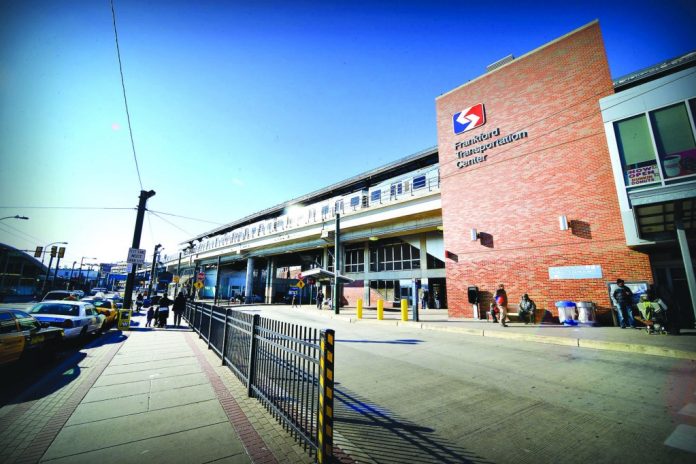Fixing a terminal problem: SEPTA Police have stepped up efforts in and around the Frankford transit stops since August. Cell phone thefts are a big problem on SEPTA transit lines, especially at the Frankford Terminal. Uniformed SEPTA officers are trying to prevent those thefts by addressing loitering. SEPTA officers, who train at the Philadelphia Police Academy and have police powers, have made arrests. MARIA POUCHNIKOVA / TIMES PHOTO
A special detail of SEPTA police officers has been working in and around transit stops in Frankford since August.
The members of Transit Team 1 are “our best and brightest … and most motivated,” Thomas Nestel, chief of SEPTA police, said in a Dec. 11 phone interview.
The chief said the transit agency’s police plot out the crime hot spots in this system and deploy team members in those areas. For example, cell phone thefts, which are a problem systemwide, are a big worry at the Frankford Transportation Center. Uniformed SEPTA officers are trying to prevent those thefts, Nestel said, “by addressing loitering … We’re keeping the future thugs of America moving.”
And by making arrests.
During the first 11 months of this year, Nestel said, SEPTA’s transit police have made 66 arrests for theft and robbery of cell phones at the terminal, Margaret-Orthodox and Church El stops.
SEPTA officers, who train at the Philadelphia Police Academy and have police powers in the city and beyond, have issued citations and made arrests. The focus at Margaret-Orthodox is drug dealing and quality-of-life issues, he said.
Team members in plain clothes have been conducting surveillance of drug sales in and around the Margaret-Orthodox El station and have made arrests of drug sellers and buyers, Nestel said.
The chief said his officers make a “concerted effort” to work with 15th District police. The Philadelphia Police Department has commissioned a Temple University study of crime in and around the Frankford terminal, Nestel said, and the PPD and his officers will use the study’s results to work out crime-fighting strategies.
CLOSER LOOK
Chief Inspector Dennis Wilson, of the Philadelphia PD’s Regional Operations Command North, said the FTC is only part of the study’s focus. Transportation hubs at Kensington and Allegheny avenues and Broad and Olney are others. Temple University professor Jerry Ratcliffe is working with the commanders of three police districts around those areas to analyze crime statistics. The goal of this “work in progress,” he said, is to help the captains better deploy their resources.
“We’ve always had issues in these three areas,” Wilson said.
Each captain as well as SEPTA’s force has an analyst “drilling down into the crime in these areas,” he said.
Philly police do that every day, he said during a Dec. 12 interview, but police do it better and faster now than they previously did. Wilson pointed to a sophisticated computer mapping system in which he can look at every crime committed in Philadelphia.
“We can see crime patterns emerge very early,” he said.
This new Temple University study, which began three months ago, is expected to go deeper.
“We’re looking at each offender, where he is from and what he was doing in the area,” Wilson said, and “we’re looking at the same information for the victims.”
He said analysts also are looking into which days the crimes were committed and the times as well as environmental factors around the crime scenes. Each of the analysts who are going over these factors are encouraged to come up with his or her own hypothesis, Wilson said, which they then are expected to back up.
SEPTA POLICE
It’s probably not common knowledge that SEPTA has its own police force.
“It’s been under the radar,” Nestel said. “It’s a viable and active police department.”
Nestel, who was a member of the city department for 23 years and former chief of Upper Moreland’s police, said SEPTA’s force was formed in 1981 to combat “wolf pack” attacks on the Broad Street Subway. It now has 275 officers.
One of the first things Nestel did when he took command of the SEPTA force in 2012 was to ask what the worst trouble spot was. The answer was pretty clear, he said. It was Kensington and Somerset. Name the problem and it was there, he said. SEPTA officers have been deployed there, and it’s been calmed down, Nestel said. ••





